

Soursop: The Thorny Graviola Fruit-Is it natural ‘miracle’ remedy for cancer?
By Eugene DSouza, Moodubelle
Bellevision Media Network
Moodubelle, 02 Mar 2014 : Few weeks back, when I had to go to Bangalore to attend my late brother’s first death anniversary memorial mass, my sister-in-law on phone asked me to get the Soursop also known as the fruit from the Graviola tree, called ‘Vodamba’ in the local language here. When asked the reason, she said that one of her acquaintances who has been the victim of cancer had requested her to get the Sourspo fruit and also leaves of the plant if possible as it is believed that the Soursop is 10,000 times more effective cancer killer than the chemotherapy. Before, proceeding to Bangalore, I plucked the largest of the Soursop fruits from one of our two medium sized Graviola plants and also a plastic bagful of leaves. On reaching Bangalore, I handed over the ‘miracle medicine’ to my sister-in-law and in turn she gave the same to her acquaintance who received with gratitude and immense satisfaction.
Just few days back, I received another phone call from a lady requesting to give at least one Soursop fruit to treat one of her cancer-affected relative in Bangalore. Though the few Soursop fruits that are dangling from the thin branches of the plants have not yet been matured, I agreed to hand over one of the medium sized fruits to someone who collected and delivered it to be taken to Bangalore.
Having heard about the importance and sudden demand for this humble Soursop fruit in the treatment of cancer, I decided to understand about the Graviola tree and the Soursop fruit in detail and surfed the internet and collected considerable amount of information out of which I have compiled this article.
About Graviola:
The scientific name of Soursop is Annona muricata. It is a small evergreen tree that generally grows in the rain forests of Africa, South America and South East Asia. It is called by different names in different regions. It is known as Graviola in Portuguese, Corossol in Frecnh, Guyabano in Spanish, Mullatha in Malayalam, Mulluramphal in Kannada and Vodamba as I have known this fruit since it had been addressed as such in my neighbourhood. The bark, leaves, roots and fruits are used for traditional remedies in many countries. Graviola extracts are used for treating infections of viruses or parasites, rheumatism, arthritis, diarrhea, dysentery, etc.
The flesh of the fruit consists of an edible, white pulp, some fiber and a core of indigestible black seeds. The species is the only member of its kind suitable for processing and preservation. The pulp is also used to make fruit nectar, smoothies, fruit juice drinks, as well as candies and ice cream flavorings. The raw Soursop fruit can be used as vegetable. When it is ripe, its taste is aa mixture of sweet and sour. The fruit contains significant amounts of vitamin C, vitamin B1 and vitamin B2.
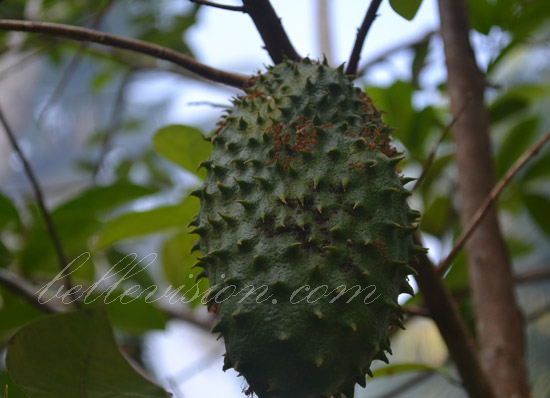
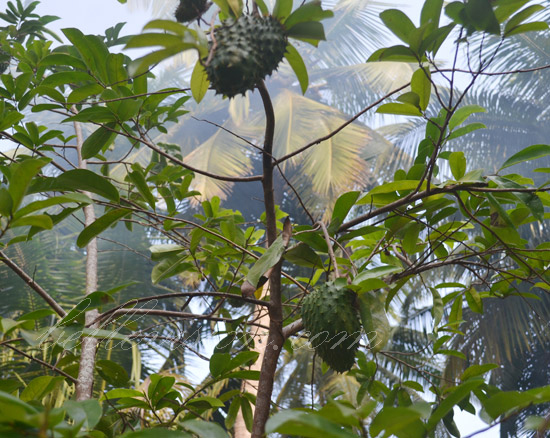
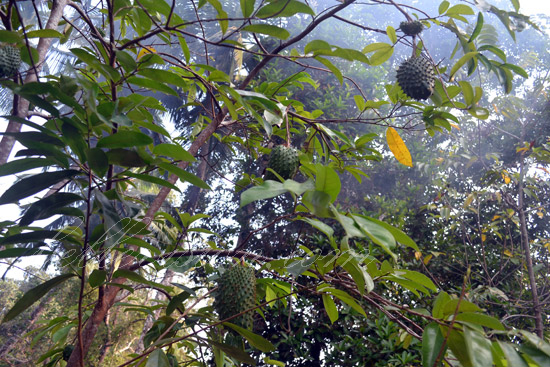
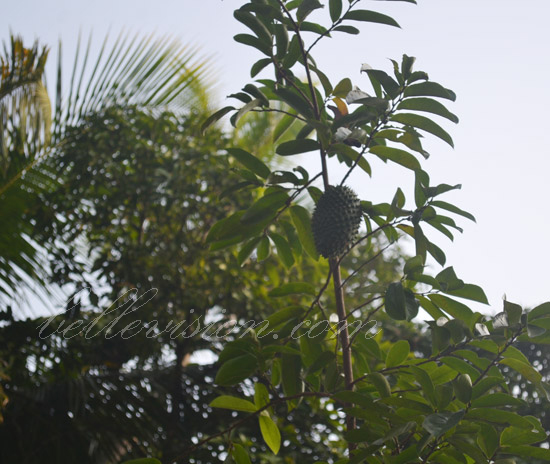
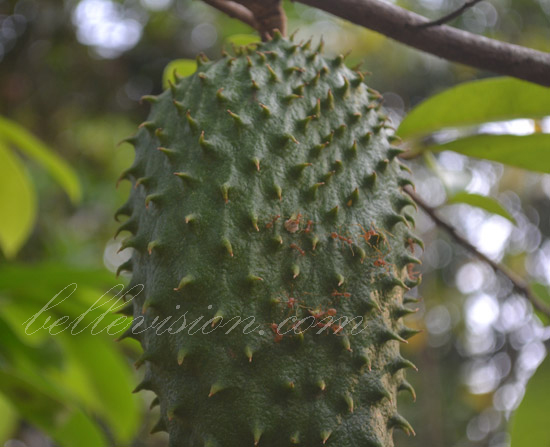


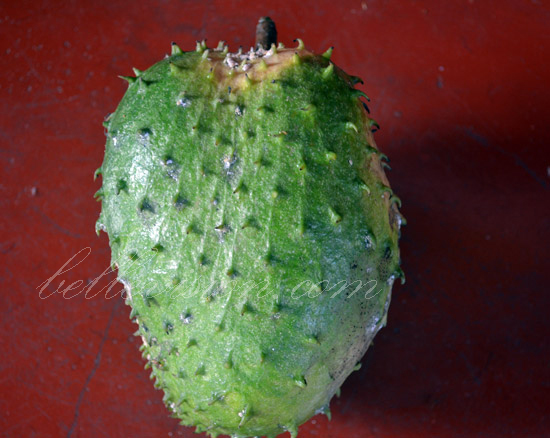

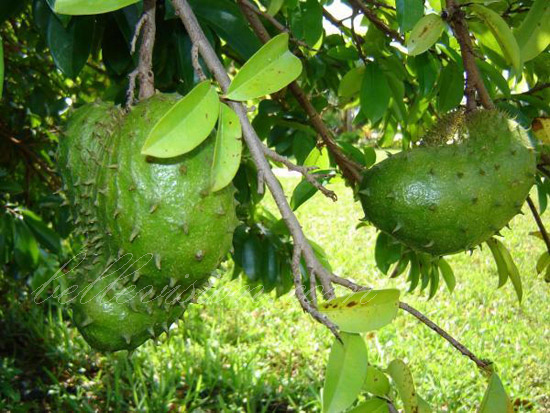
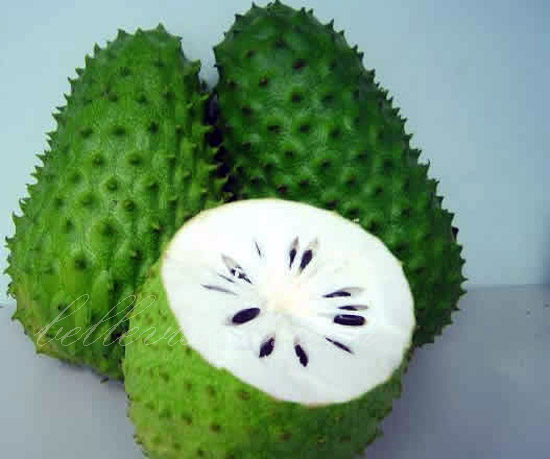
Graviola as ‘Cancer-buster’-A Hoax?
It has been believed that Soursop is a miraculous natural cancer killer which is 10,000 times stronger than chemotherapy. However, there are different opinions regarding this claim. Some of the medical experts call this tall claim as ‘hoax’.
According to one account, the idea that Soursop can fight cancer effectively started after a research at Purdue University’s School of Pharmacy and Pharmaceutical Sciences. The research concluded that the active components of the tree are unique phytochemical substances known as annonaceous acetogenins which may have chemotherapeutic potential, especially with regard to multi-drug resistant cancer cells. In certain laboratory studies it has been found that, Graviola extracts can kill some types of liver and breast cancer cells that are resistant to particular chemotherapy drugs. But these tests were only confined to test tubes and no large scale clinical tests were conducted on humans to determine the safety and efficacy for treating cancer. Thus, there is no significant evidence to show that Soursop or Graviola extracts work as a cure for cancer.
Adverse Effects of Graviola:
Those who underplay the importance of Soursop in the cure of cancer also claim that the use of the fruit and other parts of the Graviola trees may have certain adverse effects in some people especially movement disorders and nerve damage that is similar to Parkinson’s disease which is due to the very high concentration of annonacin. Graviola also has few other side effects like lowering of blood pressure so it should not be taken by people with low blood pressure or heart complications.
Was the Truth about Graviola Hidden by Drug Companies?
It is quite interesting that there are quite a number of claims that vouch for the amazing anti-cancer properties of Graviola tree and Soursop. It is said that there have been extensive research on the therapeutic nature of the Graviola extracts. According to an account one of America’s biggest billion dollar drug manufacturing companies began a search for cancer cure and their research centered on Graviola, a legendary healing tree from the Amazon Rainforest.
Various parts of the Graviola tree-including the bark, leaves, roots, fruit and fruit-seeds have been used for centuries by medicine men and native Indians in South America to treat heart disease, asthma, liver problems and arthritis.
Going on very little documented scientific evidence, the company spent huge amount of money and resources in testing Graviola’s anti-cancerous properties and were shocked by the results as Graviola proved itself to be a cancer-killing dynamo. However, the company had a big problem with the Graviola tree. Being completely natural resource, under federal law, it could not be patented and hence there was no way to make huge profits from it.
In order to avoid this problem, the drug company spent nearly seven years and poured millions of dollars in trying to synthesize two of the Graviola tree’s most powerful anti-cancer ingredients. If they could isolate and produce man-made clones of what makes the Graviola so potent, they would be able to patent it and make big money. However, in spite of all their efforts they did not succeed in replicating those ant-cancer ingredients of the Graviola tree.
As there was no way the company could protect its profits or even make good the millions of dollars that it had spent on research, its dream of huge profits ended, it practically gave up research on Graviola. The drug company not only shelved the entire research project but also chose not to publish the findings of its research.
However, one scientist from the Graviola research team, realizing the importance of the findings, risking his career contacted a company that has been dedicated in harvesting medical plants from the Amazon Rainforest and blew the whistle.
When researchers at the Health Sciences Institute were alerted to the news of Graviola, they began tracking the research done on the cancer-killing tree and the National Cancer Institute performed the first scientific research in 1976. The results showed that Graviola’s ‘leaves and stems were found effective in attacking and destroying malignant cells.’ However, the results were published in an internal report but never released to the public.
Since 1976, Graviola has proven to be an immensely potent cancer killer in 20 independent laboratory tests. In spite of this, no clinical trials, the typical benchmark that the mainstream doctors and journals use to judge a treatment’s value, were ever initiated.
A study published in the Journal of Natural Products, following a recent study conducted at the Catholic University of South Korea stated that one chemical in Graviola was found to selectively kill colon cancer cells. The most significant part of the Catholic University of South Korea report is that Graviola was shown to selectively target the cancer cells, leaving healthy cells untouched. Unlike chemotherapy which indiscriminately targets all actively reproducing cells causing the often devastating side effects of nausea and hair loss in cancer patients.
A study at Purdue University recently found that leaves from the Graviola tree killed cancer cells among six human cell lines and were especially effective against prostate, pancreatic and lung cancers.
Laboratory and field research suggest that Soursop and derived substances from the Graviola tree may have potential for various future applications such as anti-inflammatory, anti-diabetic and anticancer effects in laboratory experiments. However, large-scale studies in humans have not yet been done.
The Memorial Sloan-Kettering Cancer Center list cancer treatment as one of the "purported uses" of Soursop. According to Cancer Research UK, "Many sites on the internet advertise and promote Graviola capsules as a cancer cure, but none of them are supported by any reputable scientific cancer organizations" and "there is no evidence to show that Graviola works as a cure for cancer" and consequently they do not support its use as a treatment for cancer.
In 2008, a court case relating to the sale in the UK of Triamazon, a Soursop product, resulted in the criminal conviction of a man under the terms of the UK Cancer Act for offering to treat people for cancer. A spokesman for the council that initiated the action stated, "it is as important now as it ever was that people are protected from those peddling unproven products with spurious claims as to their effects."
The Federal Trade Commission in the United States determined that there was "no credible scientific evidence" that the extract of Soursop sold by a drug company "can prevent, cure or treat cancer of any kind."
In light of the above arguments and counter-arguments regarding the role of Soursop and Graviola extracts in the cure of cancer, it would be difficult to depend entirely on these natural remedies to fight cancer. There may be some element of truth in the arguments both for and against the efficacy of Graviola as a ‘miracle’ natural anti-cancer therapy. However, since recently, there has been increasing demand for the Soursop and Graviola leaves for the treatment of cancer. Cancer being a dreaded disease, victims of cancer and their family members and friends would go to any extent to find any kind of remedy that is being suggested or believed to have been effective in certain cases.
It is quite important to understand that in all the research that is being done in cancer or the work done with patients it has been found that there is no single diet or nutritional remedy that can ’cure’ cancer.
It has been increasingly found that by modifying one’s diet combined with change in life-style, self awareness, support from family members and friends and positive attitude one can develop confidence to face the situation and even conquer the dreaded disease as is being evident from the examples of many cancer survivors.
(Compiled from various sources)